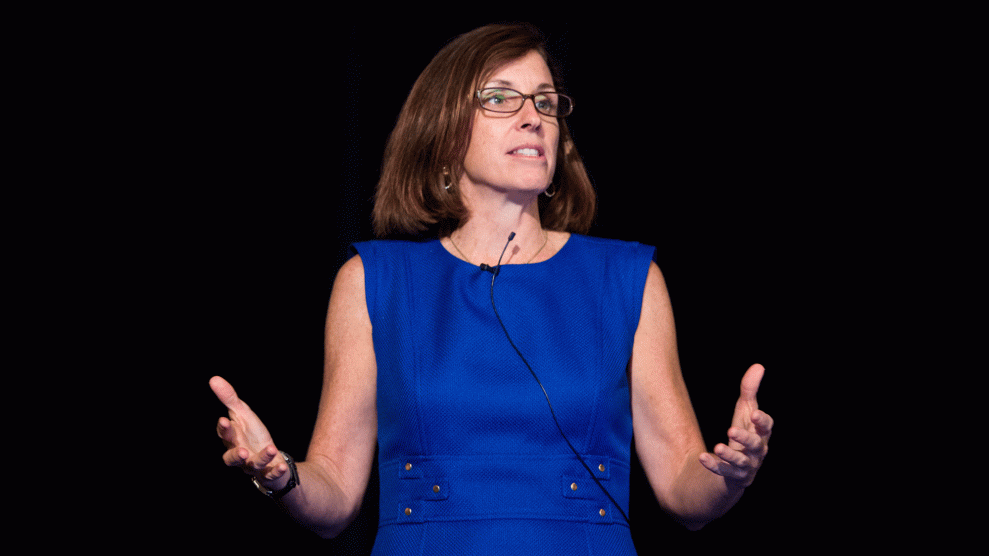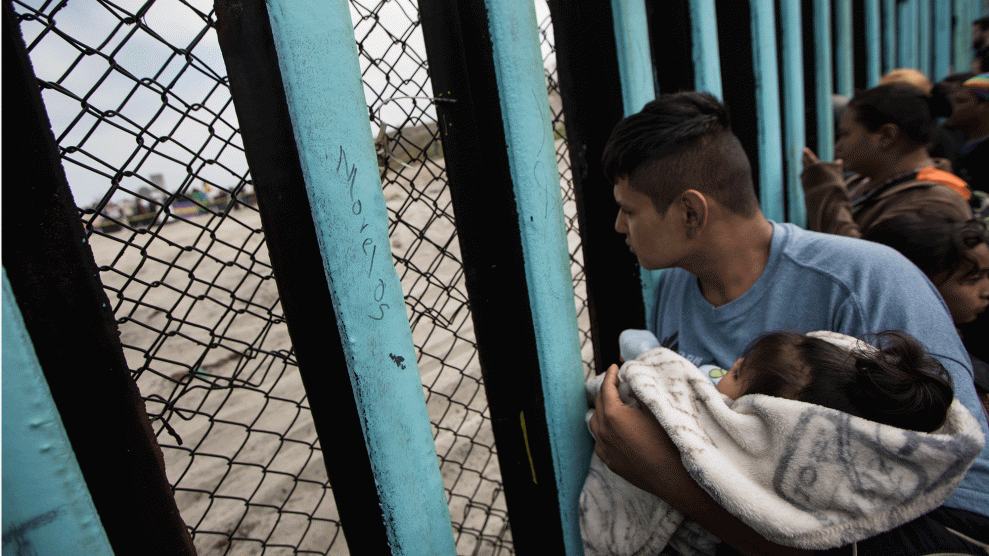
Rep. Martha McSally (R-Ariz.)Bill Clark/AP
In a House hearing on immigration Tuesday, Rep. Martha McSally (R-Ariz.) accused most asylum seekers of immigration fraud and suggested that unaccompanied children who reach the United States are likely to become MS-13 gang members. She warned that if the asylum process isn’t fixed, the country will “be confronted by another generation of DACA-like people.”
McSally opened the two-hour hearing, titled “Stopping the Daily Border Caravan: Time to Build a Policy Wall,” with an opening statement in which she referred to the recent caravan of nearly 1,500 migrants that traveled through Mexico to the US border as having been organized by an “extremist” group operating “under the guise of humanitarian action.” McSally, the chair of the border and maritime security subcommittee, also referred to the increased numbers of people fleeing their home countries to seek asylum in the United States as “individuals [who] have learned how to exploit the system.”
“Our asylum process is broken, rife with fraudulent claims,” she said. “Aliens can simply come to a port of entry or look for a border patrol agent and simply say they have a ‘credible fear.’ Saying these simple two words permits them to be released into the country about 90 percent of the time, regardless of the merits of their claim.” Many don’t show for their hearing date, she claimed, because “most likely because their claim is unfounded in the first place.”
McSally is a newly converted immigration hardliner. Less than two weeks ago, she was a cosponsor of the Recognizing America’s Children Act, which offers a pathway to citizenship for undocumented Dreamers and DACA-like people. Yet then she pulled her name from the bill, and signed on as a cosponsor of Virginia Rep. Bob Goodlatte’s Securing America’s Future Act, which would reduce legal immigration, crack down on migrant families and children, hold asylum seekers in detention, and scale back avenues for seeking asylum in the United States.
Her shift is likely an election-year maneuver: McSally is running for retiring Sen. Jeff Flake’s Senate seat in a state where anti-immigration conservatives hold sway. She is facing off in the Republican primary against Joe Arpaio, Maricopa County’s racial profiling ex-sheriff, and former state Sen. Kelli Ward, who is known as “Chemtrails Kelli” for holding a public hearing on whether the government has been poisoning its citizens by spraying chemicals from airplanes.
People came to make their voices heard today at a Homeland hearing on #immigration and #familyseperation. I hear you loud and clear. #RefugeesWelcomeHere pic.twitter.com/0TnZFtkygn
— Nanette D. Barragán (@RepBarragan) May 22, 2018
At yesterday’s hearing, McSally’s position that the United States is awash in a “sea of fraudulent [asylum] claims” was echoed by Rep. Michael McCall (R-Texas). He described Pueblos Sin Fronteras, a volunteer group that helps organize the annual refugee caravans and helps asylum seekers with legal workshops, as “lawless” and that it seeks to “overwhelm US law enforcement and tax an already overburdened immigration system with baseless asylum claims.” However, later in the hearing, Lee Francis Cissna, the director of Citizenship and Immigration Services (USCIS), said that more than 300 people from the caravan turned themselves in at the San Ysidro port of entry to request asylum. Of the 216 who have so far completed their screening, 205 have received a positive response to their asylum claims.
In addition to Cissna, Thomas Homan, the acting director of Immigration and Customs Enforcement (ICE), and Ronald Vitiello, the acting deputy commissioner of Customs and Border Protection (CBP) were on hand to answer questions from the committee members. Homan noted that only 20 percent of asylum seekers are ultimately granted asylum status, and suggested that the remainder are evidence of people trying to game the process. “If only 20 percent are winning their claim in immigration court that shows there’s a problem, an abuse of the system,” he said. Vitiello championed a new zero-tolerance policy that lets CBP refer all people who cross the border illegally for prosecution. Cissna said that asylum seekers enjoy an “overly generous screening standard.”
There was some pushback from Democrats on the committee. “I happen to know about some of these people who come over and seek asylum,” said Rep. Nanette Barragán (D-Calif.), a former immigration attorney. She noted that receiving asylum can be extremely difficult, even for people with valid claims. “I represented a family, an unaccompanied minor, when I was an attorney on a pro-bono level, and I had to go find his mom who was also in detention.” In this case, a gang had killed one of the woman’s sons. “When one of your children is killed, and you have one left, you are going to run, you are going to try to seek safe haven.” Barragán added, “It is extremely hard to get asylum… I had unlimited resources at a big law firm, I could hire experts, and even then I couldn’t get asylum. Was it a fraud? No. Did she, and they, get protections? Yes, under a different category. It took years.”
Barragán also attacked Homan’s reasoning. “I heard the comment that the fact that only 20 percent qualify for asylum means there is an abuse happening. One of the reasons it could be so low is because these people are not entitled to counsel,” she said, referring to the fact that people in immigration and asylum hearings have no legal right to a lawyer. “Having litigated asylum cases, I know firsthand how challenging it is and the difference it makes having counsel.”
Barragán then turned to Cissna. “How does USCIS determine a person’s asylum claim is fraudulent?”
“If the person says something that manifestly does not conform to the facts on the ground, we would determine they were lying and therefore made a fraudulent claim,” Cissna responded.
“Do we have any numbers about how many were actually fraudulent under that definition you just explained?”Barragán asked.
“No. We don’t have any numbers on how many people are making fraudulent claims either in credible fear or regular asylum, yet, but we’re working on that,” he replied.
“Do you have any numbers on how many asylum claims were denied by USCIS in recent years that have led to perjury charges?”
“No, I don’t have that available.”
McSally wrapped up the hearing by sharing her wish list of changes to the immigration and asylum system: raising the standards for initial asylum interviews at the border, holding asylum seekers in detention “as long as it takes” until their claims are processed, canceling a person’s asylum status if they ever visit the country they fled, and increasing the penalties for false asylum claims to “deter and hold people accountable.” “These all are in our bill,” she stated proudly. The Securing America’s Future Act is currently before House Judiciary Subcommittee on Immigration and Border Security.













